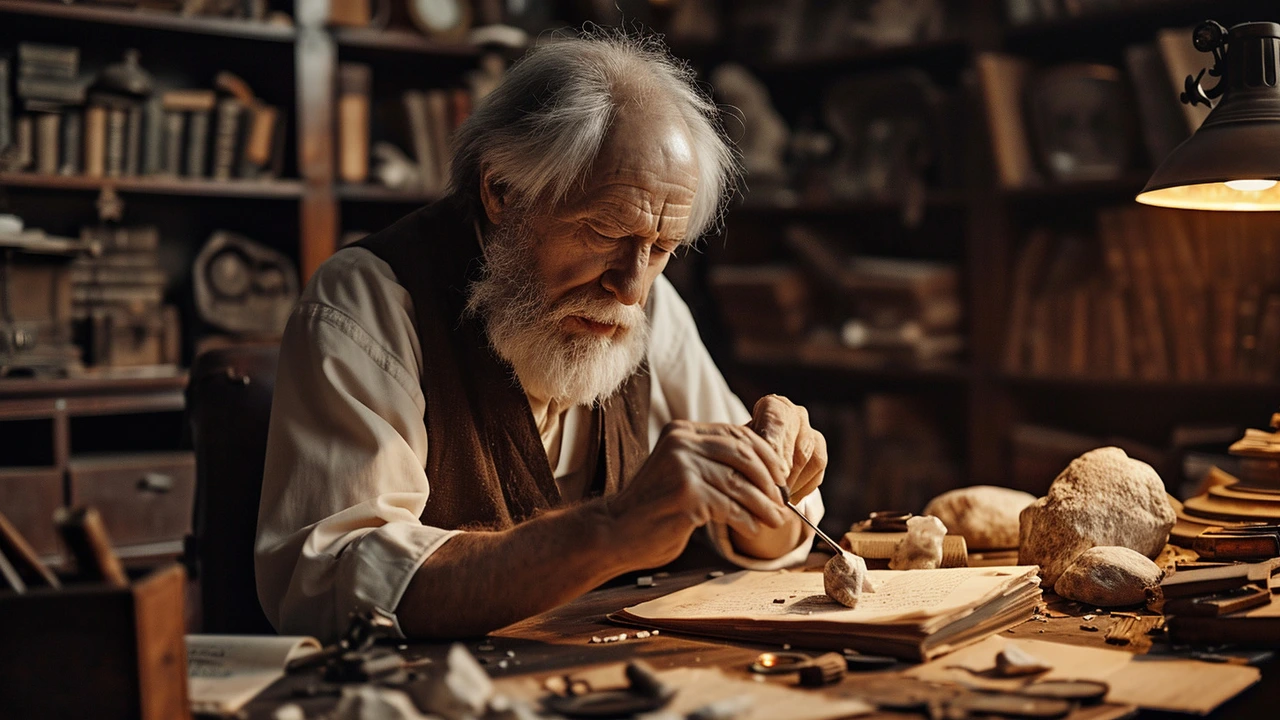
The Quest for the First Tooth Fossil
Picture this: It's the mid-19th century, and scientists are scurrying around the globe with shovels and picks in hand, eager to unearth the tales encased in stone and soil. Amid this excitement, there's something seemingly trivial yet profoundly significant awaiting its curtain call: the humble tooth fossil. It's challenging to pinpoint exactly who first stumbled upon a tooth fossil, considering such discoveries were not well-documented in their earliest instances. What's known is the fact that these dental relics were frequently unearthed during excavations of ancient sediments and burial grounds.
Teeth, after all, are the hardest parts of the human body and stand the test of time better than any other component of our skeletal frame. They are often the sole surviving evidence of past life, including our human ancestors. It's believed that some of the earliest fossils discovered were not recognized for what they truly were. They slipped into collections as curiosities, with their scientific value only truly acknowledged later on by pioneering paleontologists.
The Light That Teeth Shed on Our Ancestors
The importance of these dental records cannot be overstated. Each tooth discovered is embedded with a story, and when pieced together, they form an epic narrative of evolution and adaptation. By examining the structure, wear, and composition of these ancient teeth, scientists can deduce not just the diet of our forbearers but their habits, health, and even social structures.
- Teeth can indicate the age at death, with patterns of eruption and wear painting a clear picture of life stages.
- Isotopic analysis can tell us about the diet and migration patterns of ancient populations.
- Cavities and tooth decay speak volumes about changes in diet, particularly with the introduction of agriculture and processed foods.
- Even the smallest details, like microscopic scratches and grooves, can reveal what was eaten and how food was prepared.
No doubt, these seemingly small pieces are potent time capsules, offering an intimate look at prehistoric life.
Tracing the Historical Context of Early Human Dentistry
As our understanding of these fossils grew, so too did our realization of how advanced early humans were when it came to dental practices. Archaeological finds have shown that Neanderthals used 'toothpicks' to dislodge trapped food and that various forms of primitive dentistry were in play well before the advent of civilization as we know it.
Incredibly, evidence of drillings on teeth from as far back as 9,000 years ago has been found, pointing to a rudimentary understanding of dental care and perhaps even pain relief. These early dentists were not operating with sophisticated technology, but their resourcefulness with what they had is nothing short of remarkable.
The Evolution of Dental Practices and Hygiene
Fast forward to ancient civilizations such as the Egyptians, the Greeks, and the Romans, and you'll find a rich history of dental knowledge and practices. Texts and treatises have been discovered that detail explicit dental procedures, dental disorders, and even recommendations for maintaining oral health. For instance, the Edwin Smith Papyrus, an ancient Egyptian text, includes references to teeth-related treatments dating back to 1700 BCE.
Moreover, these societies often had individuals who were designated as 'tooth doctors,' pointing to the specialization in dental care. Dental hygiene practices including various chewing sticks, herbal concoctions, and early forms of toothpaste can be traced back to these times as humans grappled with maintaining oral health.
The Modern-Day Importance of Tooth Fossils
In today's world, tooth fossils continue to be a gold mine for researchers. These tiny time capsules are vital for understanding our origins and evolution. The study of ancient teeth has modern implications in the fields of anthropology, genetics, and even medicine. As we continue to unravel the DNA preserved in dental calculus (tartar), we're able to gain insights into ancient diseases, and microbiomes thus offering glimpses into how certain health conditions have evolved with us.
From a simple tooth emerges an intricate web of information about our species and many before us. It's a testament to the power of paleontology and the enduring search for knowledge about our past. So while it's hard to award the title of 'first discoverer' of the tooth fossil, it's safe to say that the impact of these finds has been, and continues to be, profoundly transformative.
Write a comment
More Articles

Dental mirror: How to use it for checking the condition of dental deformities.
In this blog post, I'll walk you through how to use a dental mirror to check for signs of dental deformities. A handy tool for maintaining your oral health, a dental mirror can reveal what your regular toothbrush may miss. From minor concerns like plaque buildup to identifying potential deformities, dental mirrors are essential in proactive oral care. So, loosen up, grab your dental mirror, and let's take a closer look at our oral health together!

How Fixed Braces Affect Your Shopping Choices
Discover how fixed braces can influence your shopping habits. Learn helpful tips and interesting facts about choosing foods, maintaining hygiene, and selecting products that make life with braces easier. This guide offers practical advice and insights for anyone with fixed braces.

Veneers for crooked teeth: What are the latest technologies?
Hey there! In our latest blog post, we dive into the world of veneers for crooked teeth, exploring the latest technologies that are revolutionizing the way we achieve perfect smiles. Catch me as I share astounding advancements in dentistry that have made the process more efficient and successful. Not only will we touch base on aesthetics, but also on the process and effectiveness of these cutting-edge techniques. Let's set on this informative journey for a healthier, flawless smile.

